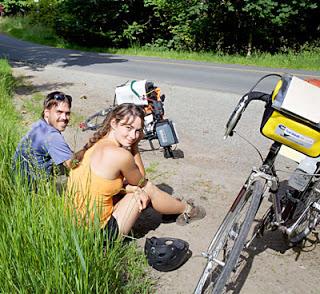By Jake Skinner
This blog entry is the end result of two weeks of communal inquisition into sustainability issues affecting Salt Spring and Pender Islands. Our first week was the field research. The entire MA SLM student class traveled to Salt Spring and Pender Islands to learn from locals about sustainable initiatives and challenges facing their communities. The immersion in dialogue and setting helped students see challenges and successes first hand. Upon return, we were given a week to prepare a report, which focused on addressing three questions pertaining to a central social pillar. I chose to focus on transportation challenges, to and on Pender. My report tried to spotlight the challenges facing sustainable transportation, showcase initiatives or organizations that are devoted to addressing the challenges and located two case studies that may hold valuable information in addressing the challenges.
The third part of the report introduced two “outside” initiatives addressing similar challenges in slightly different contexts: the Small Ferries Project (http://www.smallferriesproject.com/) and the CRD's Pedestrian and Cycling Masterplan (PCMP) (http://www.crd.bc.ca/transportation/plans/pedcyc-plan.htm). The Small Ferries Project is a joint project between Scotland, Northern Ireland and Ireland to create a small fleet of ferries to service some of their remote islands. Unique to the project was the encouragement of local operators to bid for contracts to lease boats to provide government sanctioned “lifeline” services, encouraging local participation. The small ferries are also highly innovative and showcase some of the best green technologies, reducing environmental impact. Their size also makes them sustainability attractive, compared to BC Ferries supertankers. The CRD's PCMP also seems to offer an attainable fast-track to regional inclusion in cycling and pedestrian infrastructure. Lessons could also be learned by partnering with adjacent Islands’ alternative transportation organizations, such as Island Pathways on Salt Spring Island.
The field work, report and presentation have deepened my experience and perception of communal consultation. I sincerely feel that I have learned more academically in the last two weeks, then in the last two years. I am excited to see what's next to come!



